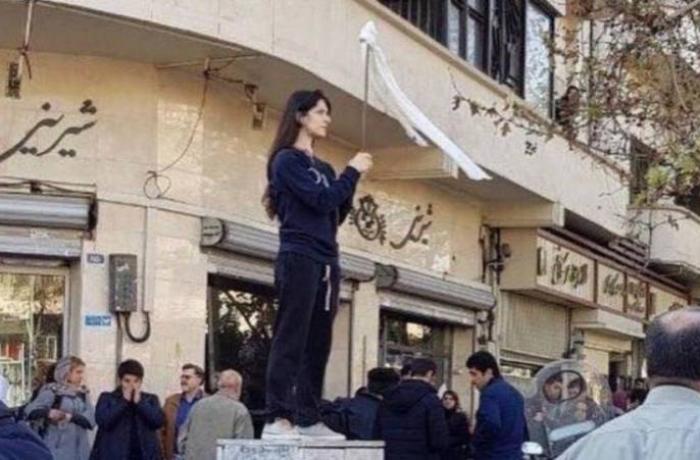Vida Movahedi stands on a junction box in Tehran’s Revolution Street to protest compulsory hijab, December 27, 2017
Women’s rights activist Vida Movahedi has been released from prison in Iran after seven months in detention.
Movahedi was prominent in the movement protesting the compulsory hijab law since late 2017, as one of the women standing on junction boxes in city streets and waving their headscraves from the ends of poles.
Her attorney Payam Derafshan announced her release, saying the remainder of her one-year sentence had been “forgiven”.
State news agency IRNA indicated that Movahedi was freed after accepting limits on her expression:
According to Derafshan, his client had no intention of plotting anything and has said that she simply wanted to express a personal celebration. To avoid any links with those who went abroad and tried to take political advantage of her personal action, she has always refused to express her views through foreign media outlets….
So therefore the judge, taking into consideration that she’s the mother of a small child, decided to expedite her freedom.
At least 32 women have been arrested since 2018 for protesting the hijab law. Four of them, including Movahedi, were prosecuted.
Yasaman Aryani and her mother Monireh Arabshahi were detained in early April 2019. Their statuses are unknown.
Movahedi was initially arrested on December 27, 2017, after she stood on a utility box on Revolution Street in Tehran and waved her headscarf. Movahedi — whose lawyer was Nasrin Sotoudeh, now held as a political prisoner — was released the next day with a fine.
On October 23, Movahedi was re-arrested after she waved her hijab and balloons while standing on a dome in the middle of Revolution Square. She was sent to Gharchak Prison in the south of the capital.
On March 2, she was sentenced for “encouraging people to corruption and prostitution”.
Iran’s Islamic Penal Code sets out punishment for not wearing a headscarf: “Women, who appear in public places and roads without wearing an Islamic hijab, shall be sentenced to 10 days to two months’ imprisonment or a fine of 50,000 to 500,000 rials.”
Harsher sentences can be imposed under morality-based charges.

